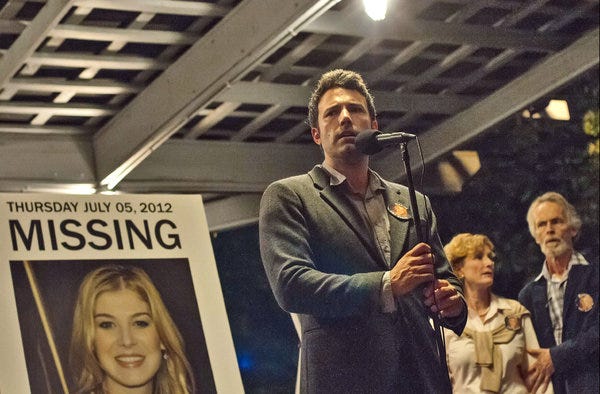Gone Girl

"Gone Girl" establishes its duality with one simple yet striking cut. Like a cool flip of a coin, it turns from a shot of its protagonist kissing his wife to a shot of him being swabbed for DNA in relation to her possible murder. The film is about this kind of stark, startling contrast — normalcy interrupted by mayhem. Unfortunately, it ceases being surprising.
When his somewhat snobby, native New Yorker wife, Amy (Rosamund Pike) goes missing from their Missouri home on the morning of their fifth anniversary, failed writer Nick Dunne (Ben Affleck) finds himself tangled in a mystery he could never imagine.
Based on the book and adapted by author Gillian Flynn, "Gone Girl" is the kind of rabbit-hole tumble in which director David Fincher usually emerges victorious. It has the same rich, stomach-churning atmosphere of dread as "Se7en," "The Game" and "Zodiac" — thanks in large part to Trent Reznor and Atticus Ross’s grinding, industrial score, which is supposed to sound like pleasant spa Muzak unraveling into an aural nightmare. The film is about this kind of intense change, but once it unravels into a nightmare, it quickly stops startling us.
In the latter half of "Gone Girl," the film and its characters hit only one note. Nick ambles around, angry yet harmless. Affleck never makes us feel the sense that his character would go to any real extremes. His sister (Carrie Coon) is supportive yet sometimes resentful of Nick for the mess he is in — and that’s about all she is. Kim Dickens is engaging but one-dimensional — the sassy southern detective. Tyler Perry is the slick, charming defense attorney. Neil Patrick Harris is Amy’s creepy, rich ex-boyfriend. Worst of all, Amy devolves into nothing more than a nutcase.
The characters live up to kind of caricatures created by the sensationalist media in the film. That would be just fine if the movie were strictly a media circus satire in the vein of "Natural Born Killers" or "To Die For." But it’s a problem for characters to repeatedly hit heightened, one-dimensional notes in a film also trying to be an earnest drama. Once you know what they're up to, they grow tiresome.
The bottom line is that "Gone Girl" is Fincher’s weakest film. That’s not to say the movie is bad. It’s intriguing and atmospheric. But unlike Fincher’s other films, it doesn’t offer much beyond its alluring air of mystery. It’s like a "Law & Order" episode given the Fincher treatment — B-grade entertainment wrapped up in an A-list package. It has darkly exciting music and imagery — the shot of Nick standing at the top of his stairs, illuminated by the flashing lights of the media outside his home, is particularly powerful. But I can't praise the movie for simply having an arresting sheen.
The worst crime a mystery film can commit is ceasing to surprise its audience. "Gone Girl" is the kind of movie that has you slouching back in your seat when you should be leaning forward, on the edge, white-knuckling the armrest. It’s a movie about how there is a flipside to every coin, and it ironically ends up being one-dimensional.
[youtube http://www.youtube.com/watch?v=Ym3LB0lOJ0o&w=500&h=315]


